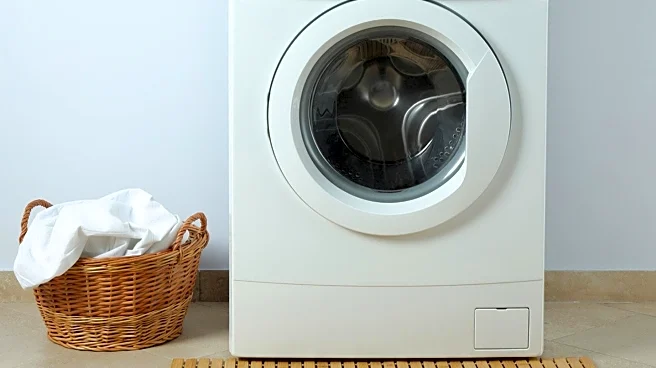What's Happening?
Consumer Reports has released new guidelines for laundry practices aimed at reducing energy consumption and costs. Rich Handel, a laundry expert from Consumer Reports, suggests using high-performance detergents, such as Tide Plus Ultra Stain Release, which costs 88 cents per load, or Costco's Kirkland Signature detergent at 14 cents per load. Handel advises against using fabric softeners and dryer sheets, as they can leave residues on clothes and affect the dryer’s moisture sensor, leading to longer drying times. Additionally, he recommends using cold water for washing, as heating water accounts for nearly 90% of a washer's energy use. For drying, using the dryer’s automatic cycle setting or opting for air drying methods like clotheslines can further reduce energy usage.
Why It's Important?
The recommendations from Consumer Reports are significant as they address the growing concern over energy consumption and its impact on household expenses. By adopting these practices, consumers can lower their energy bills and contribute to environmental sustainability. The emphasis on using cold water and avoiding fabric softeners aligns with broader efforts to enhance energy efficiency in household appliances. These changes not only reduce operational costs but also support the global push towards carbon neutrality by minimizing energy waste. As energy-efficient practices become more prevalent, they can lead to substantial savings for consumers and reduce the overall carbon footprint of households.
What's Next?
As consumers become more aware of the benefits of energy-efficient practices, there may be increased demand for products that support these initiatives. Manufacturers could respond by developing more energy-efficient appliances and detergents. Additionally, there might be further educational campaigns to inform the public about the advantages of these practices. Policymakers could also consider incentives for households that adopt energy-saving measures, further encouraging widespread adoption. The shift towards energy efficiency in laundry practices could serve as a model for other household activities, promoting a broader culture of sustainability.
Beyond the Headlines
The move towards energy-efficient laundry practices highlights a cultural shift towards sustainability and environmental responsibility. It reflects a growing awareness among consumers about the impact of their daily activities on the environment. This trend could lead to increased scrutiny of other household practices and products, driving innovation in sustainable living solutions. The emphasis on reducing energy consumption also raises ethical considerations about resource use and the responsibility of individuals and companies to contribute to environmental preservation.










